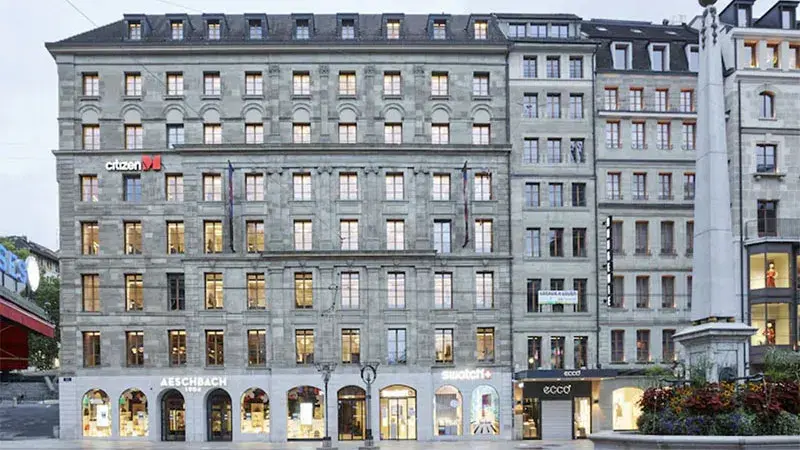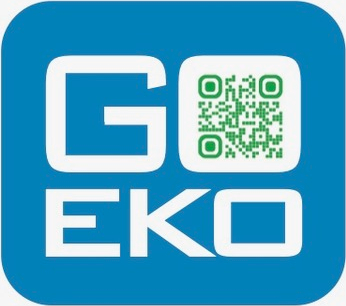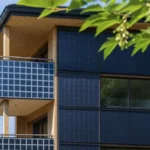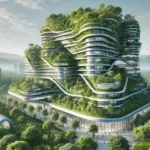In today’s world — marked by climate urgency, rising energy costs, and evolving guest expectations — sustainability in hospitality is no longer a marketing claim. It’s a strategic imperative.
Across Switzerland and Europe, hotels adopting environmentally responsible solutions are seeing measurable results: a reduced carbon footprint, lower operating costs, and a stronger competitive position.
High-performance insulation, renewable energy, modular construction, and circular design are reshaping the industry. The message is clear: sustainability and profitability now go hand in hand.
Why Sustainable Hospitality Has Become Unavoidable
A decade ago, sustainable hospitality was perceived as an optional extra — something for pioneers or boutique brands. But the situation has changed. The evidence is overwhelming: sustainability is not an added cost, but a strategic investment.
On one side, regulations are tightening. In Switzerland, energy efficiency standards such as Minergie are setting new benchmarks for how hotels should manage resources. On the other, consumer expectations are evolving fast. Younger generations, in particular, demand transparency and authenticity. They prefer hotels that can demonstrate reductions in carbon emissions, water use, and waste.
In Switzerland’s high-cost hospitality market, the ROI is clear: hotels that upgrade insulation, optimize HVAC, and reuse greywater can cut annual energy and water bills by CHF 100k–300k, depending on size and baseline. Efficiency in hotels isn’t just sustainable — it’s smart business.
In short, sustainability has become a driver of overall performance, combining compliance, profitability, and guest loyalty.
Concrete Solutions for More Sustainable Hotels
Swiss hotel sustainability is well underway: smart building tech (BMS/IoT), HVAC optimization, passive design, and disciplined operations are boosting energy efficiency, reducing water use, and lowering operating costs.
Reducing and Reusing Water
Replacing taps and showerheads with low-flow models, adjusting water pressure, and encouraging guests to reuse towels can save millions of liters per year.
Some properties go further, reusing greywater from sinks and showers for cleaning or irrigation — a practice that delivers fast paybacks, especially in regions where water costs are high.
Energy Efficiency and Smart Management
Energy use remains the hotel sector’s largest source of emissions — and the most promising opportunity for savings.
Combining high-performance insulation with smart building systems (for heating, ventilation, and lighting) can cut consumption drastically while improving comfort.
Hotels that comply with Geneva’s HPE standards are now achieving energy reductions of 25–30% compared to pre-renovation levels, while also increasing property value.
Waste Management and Circular Design
Hotel restaurants generate significant organic waste. Increasingly, this waste is being transformed into compost or biomass, contributing to a circular model that minimizes incineration.
At the same time, hotels are eliminating single-use plastics and integrating upcycled materials into their interiors — from furniture made with reclaimed wood to carpets woven from recycled fibers.
The circular hospitality approach reduces environmental impact and enhances brand identity: sustainability becomes part of the guest experience, not a hidden back-office task.
Renewable Energy
Solar, geothermal, and heat recovery technologies are becoming standard across Swiss hotels.
These systems not only cut carbon emissions but also hedge against energy price volatility and reduce operation costs (OPEX). For properties that rely heavily on heating and hot water, renewables deliver both environmental benefits and cost stability with a clear ROI.
Data and Digitalization: The Hidden Backbone of Sustainable Hospitality
Sustainability today is as much about data as it is about design.
The hotels leading the sustainability transformation are those that have turned digital monitoring into their main decision tool.
Smart building systems now track energy, water, and occupancy data in real time, helping hotel teams detect anomalies before they become losses. At scale, these systems provide the evidence needed for ESG reporting and certification under frameworks like CSRD, Minergie, or BREEAM.
In Switzerland, several properties have already adopted AI-driven energy management to optimize performance. In Geneva and Lausanne, hotels using predictive algorithms to regulate heating and ventilation have reduced annual energy consumption by up to 18%, all while improving guest comfort.
Digitalization, therefore, is not only about automation — it’s about transparency, traceability, and trust.
If you can measure it, you can improve it.
Inspiring Example: Accor’s Greet Concept
The Greet brand by Accor shows how circular thinking can reinvent hospitality.
The idea is simple: give objects a second life, reduce waste, and put conviviality back at the center of the guest experience.
Most of the furniture and decorative pieces in Greet hotels come from upcycling — sourced, repaired, or repurposed from local suppliers. Each property tells its own story, reflecting regional character rather than corporate uniformity.
Even food service follows this principle: unsold pastries become bread pudding, leftover produce is reinvented in creative dishes. The result? Less food waste, lower costs, and more authenticity.
These small gestures accumulate into measurable results — and they resonate deeply with a generation of travelers seeking genuine, eco-conscious, socially responsible hospitality.
Financing the Transition: How Green Investment Fuels Competitiveness
For many hotels, the biggest barrier to sustainability isn’t motivation — it’s capital.
But that is changing rapidly.
Switzerland’s financial ecosystem is increasingly aligned with sustainability goals. Banks and institutions now offer green loans and ESG-linked financing that reward energy-efficient renovations, renewable integration, and certified operations with preferential interest rates.
Through GoEko’s platform, for instance, hoteliers can connect directly with financing partners specialized in sustainable projects.
These partnerships make it easier to convert a sustainability plan into a business case — one that’s both measurable and bankable.
As energy costs rise and regulations tighten, investing in sustainability is cheaper than staying inefficient.
In other words, green finance is not just funding a transition — it’s accelerating it.
Measurable Benefits of Sustainability in Hospitality
Implementing sustainable practices in hotels delivers quantifiable results, both operational and reputational.
- Regulatory compliance: With stricter energy and environmental regulations, early adoption prevents costly retrofits later.
- Guest preference: According to Booking.com’s Sustainable Travel Report 2024, more than 80% of travelers consider sustainable practices important when choosing accommodation.
- Well-being: Energy-efficient design improves air quality and comfort for guests and staff alike, contributing to satisfaction and retention.
- Operational savings: Energy, water, and waste optimization generate lasting cost reductions — between 10% and 20% annually, depending on the building type and technology used.
In short, sustainability strengthens both environmental performance and business resilience.
Beyond the Building: Hospitality’s Role in the Local Sustainability Ecosystem
Sustainable hospitality doesn’t end at the property line. The most forward-thinking hotels in Switzerland are extending their sustainability strategy into the communities around them.
They source food from regional farmers, support local artisans, and create jobs with purpose.
This localized approach reduces supply chain emissions while strengthening economic resilience — a concept increasingly referred to as “regional sustainability”.
For example, mountain lodges in the Valais and Jura regions have begun partnerships with local forestry cooperatives to source renewable heating fuel, closing the loop between tourism and the landscape it depends on.
When a hotel invests in its community, it doesn’t just lower its footprint — it builds loyalty and reputation that no marketing campaign can buy.
A Visionary Perspective: Hervé Houdré and the Spirit of Sustainable Hospitality
One of the pioneers of this approach, Hervé Houdré, summarized it well: “Sustainability is not a goal but a journey made of concrete, cumulative actions.”
For Houdré, each initiative — however small — is a building block toward larger impact: reducing costs, improving brand reputation, and creating value for the community.
His philosophy, once considered idealistic, is now proven by data. The most profitable hotels today are those that integrate sustainability into every layer of decision-making — from design and sourcing to reporting and marketing.
This is what the sustainable hospitality movement in Switzerland embodies: pragmatism with purpose.
Real-World Savings and Examples
Sustainability isn’t theory — it’s measurable impact.
At Caesar’s Palace in Las Vegas, a simple towel reuse program saved over 113 million liters of water in one year, cutting operational costs by millions of dollars.
Marriott International, by phasing out single-use toiletry bottles, saved 14 million dollars annually and reduced plastic waste dramatically.
And according to a 2023 Urbanland study, modular construction can shorten building times by up to 30%, reduce waste by 50 kg per m², and cut CO₂ emissions by half compared to traditional construction.
These figures demonstrate that sustainable practices not only protect the planet but generate tangible economic returns.
CitizenM in Geneva and Zurich: Modularity and Innovation in Urban Hospitality
The Dutch hotel chain CitizenM perfectly illustrates how modularity and innovation can drive sustainable hospitality.
Their Swiss properties, in Geneva and Zurich, were both created using prefabricated modules built off-site and assembled on location — drastically reducing construction time, disruption, and waste.

In Geneva, CitizenM transformed a 1970s office building into a certified High Energy Performance (HPE) hotel, preserving the original structure instead of demolishing it. This avoided thousands of tons of waste and reduced CO₂ emissions associated with new construction.
In Zurich, another retrofit project applied the same approach — compact, functional rooms, full LED lighting, and smart energy management systems — a blueprint for sustainable urban hospitality.
Conclusion: A Strategic Imperative for the Future of Hospitality
Embracing sustainability in hospitality is no longer optional — it’s essential to remain competitive.
For Swiss hotels, the shift brings clear advantages: optimized energy performance, stronger brand loyalty, and alignment with the country’s reputation for innovation and environmental responsibility.
As Hervé Houdré reminds us, true sustainability balances planet, people, and profit — the triple bottom line. It’s about creating hotels that are not only profitable but also purposeful.
The Swiss hospitality sector has already begun this transformation. Its leaders are proving that ecology and competitiveness are not contradictions, but two sides of the same resilient future.
FAQ: Sustainable Hospitality in Switzerland
What is a sustainable hotel?
A hotel that integrates energy efficiency, water conservation, waste reduction, and social responsibility into its operations and management — while staying profitable.
What are the economic benefits?
Lower operating costs, reduced energy expenses, enhanced brand reputation, and better guest retention.
Which examples stand out in Switzerland?
CitizenM Geneva, SwissTech Hotel Lausanne, and Hôtel des Horlogers in Le Brassus — all certified under Geneva’s HPE standard or Minergie label.
How can a hotel reduce its carbon footprint?
Through improved insulation, renewable energy, efficient HVAC systems, waste reduction, and responsible sourcing.
Which certifications are relevant?
Minergie, Minergie-ECO, THPE, HPE, and international standards like BREEAM or LEED.
What innovations are transforming hospitality?
Modular construction, smart energy management systems, circular design, and partnerships with local suppliers and artisans.
How can small hotels begin?
Start with energy and water audits, implement quick wins, and use GoEko’s cleantech platform to identify ROI-driven technologies and financing options.
What role does GoEko play?
GoEko supports Swiss hoteliers in identifying and implementing cleantech solutions, making sustainable transformation faster, more accessible, and more profitable.
Daniel has 20 years of experience in business and financial journalism, having worked in Zurich, Tokyo, Buenos Aires, and Mumbai. Over the years, he has covered start-ups, cleantech, and the Swiss construction sector in depth.
Deeply concerned about environmental issues and fully aligned with Raphaël’s vision of making the ecological transition more accessible and impactful for companies, he joined the project and co-found GoEko alongside him.




